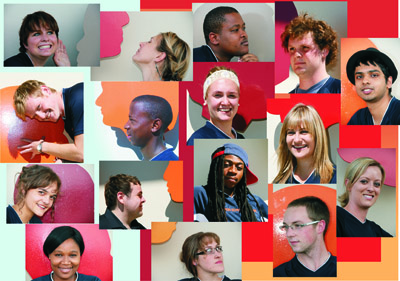Latest News Archive
Please select Category, Year, and then Month to display items
12 January 2024
|
Story Nonsindiswe Qwabe
|
Photo Sonia Small
 Since joining the UFS in 2008, Dr Grey Magaiza has worked extensively on approaches that can foster the socio-economic transformation of societies.
Since joining the UFS in 2008, Dr Grey Magaiza has worked extensively on approaches that can foster the socio-economic transformation of societies.
“The future should be one where communities can decide on their development agenda and futures. That’s the most important for me.” Dr Grey Magaiza, Deputy Director of the Centre for Gender and Africa Studies (CGAS) and Head of the Community Development programme on the Qwaqwa Campus, is passionate about capacitating communities to be agents of change and advancement. His vision for the future emphasises the empowerment of communities to take charge of their development by actively participating in decision making and the implementation of development projects that can improve their lives.
Since joining the UFS in 2008, Dr Magaiza has worked extensively on approaches that can foster the socio-economic transformation of societies. Over the years, he has crafted his research speciality into one that he is most proud of – being an interdisciplinary scientist immersed in the development of communities.
“I’m in a fortunate position of researching what I like. I say ‘fortunate’, because I’ve taken the time to understand what I’m passionate about, which is the overall field of rural livelihoods and livelihood futures – in short, community development. My research starts from an engaged university, understanding the elements that a university must use to enhance transformation and relevance to its immediate community in terms of development.”
One of the ways he has done this is by looking at social entrepreneurship as a development approach for young people in a rural setting. Through workshops with non-profit and civic organisations in Qwaqwa, Dr Magaiza has been helping these organisations to map out their needs and actively meet them through the involvement and support of external role players.
“We understand that communities are part of the national development agenda, but even that national agenda respects community knowledge and intentions and allows communities to shape their identity. A critical enabler of this is community organising. You bring back the capacity in communities to have dialogues on issues affecting them as spaces for engagement, knowledge exchange, and for people to just talk about their way forward.”
By enabling communities to define their development agenda, they can address their specific needs, challenges, and aspirations, he said. “When I look at livelihood futures, it’s quite an exciting aspect of my work – it’s like looking into a fortune tellers’ globe, because you’re not deciding for communities what they should do, but the communities themselves take those decisions.”
Odeion School of Music Camerata to perform in Russia
2013-07-31
|
 |
| 31 July 2013 |
OSM CAMERATA "Die Spokewals" by Hendrik Hofmeyr under the baton of Jan Moritz Onken (YouTube)
After a successful audition, the Odeion School of Music Camerata (OSMC) received an invitation to participate in the 13th International Conservatory Festival which will take place in St Petersburg, Russia, from 1 to 9 November 2013. The festival is a yearly highlight on the concert calendar of the prestigious Rimsky Korsakov Conservatoire.
The artistic panel of the festival, under the leadership of Prof Lydia Volchek, annually selects ten international conservatories to gather in St Petersburg for the festival. Some of the participants include the Tchaikovsky Conservatoire: Moscow, Conservatoire de Paris, Eastman School of Music NY and the Sibelius Academy in Helsinki Finland. According to the Rector of the Rimsky Korsakov Conservatoire, Prof Mikhail Gantvarg, it will be the first ever school of music hailing from Africa to participate in the festival.
The OSMC was requested to give two recitals of 40 minutes each during the festival. Maestro Jan Moritz Onken (Chief Conductor of the OSMC for 2013) will lead the ensemble to St Petersburg. OSMC members will have the opportunity to attend all concerts presented by fellow participants as well as masters’ classes presented by the masters of St Petersburg Conservatoire.
The festival is usually opened and closed with a grand concert presented by the St Petersburg Conservatoire Symphony Orchestra (70 plus members). Last year the opening concert was conducted by the celebrated master, Valery Gergiev (artistic director of the Mariinsky Opera and Symphony Orchestra), while the closing ceremony was conducted by Semyon Bychkov – reciting the Leningrad Symphony by Shostakovich. Both Gergiev and Bychkov are alumni of the St Petersburg Conservatoire.
All recitals at the festival will be presented in the Opera and Theatre Hall of the Conservatoire, as well as in the acclaimed Glazunov Concert Hall located within the colossal conservatory building.
The OSMC will recite a programme of mainly South African composers, with two new works commissioned by the OSM New Music Initiative. These were written by the prolific South African composer, Hendrik Hofmeyr: laureate of the Queen Elizabeth International Composition Competition, entitled Spokewals / Phantom Waltz and Notturno Elegiaco. Spokewals / Phantom Waltz is a challenging work where musicians simultaneously play, sing and speak.
A reworked edition for chamber orchestra of the original string quartet for piano and soprano, Liedere op Boesman-verse, by revered South African composer, Stefans Grové, will also be performed. To commemorate the centenary of composer Benjamin Britten this year, Cantus in Memoriam of Benjamin Britten by Arvo Pärt is also included in the programme.
After participating at the festival in St Petersburg, the ensemble will depart for a two-day visit to Moscow where the OSMC will perform an ’All South African’ programme.